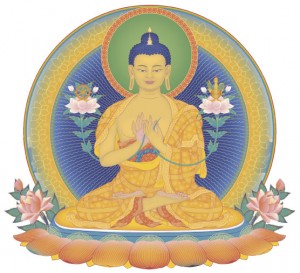| Buddhism in Everyday Life |  |
| The Daily Meditation |
Dharma
Buddha Shakyamuni never claimed to have any higher authority for his teachings than his own experience. Buddhist teachings consists of philosophy (wisdom) , ethics (kindness and compassion), and the psychological techniques (meditation) for developing wisdom and compassion. The three aspects are deeply interlinked to the point of being inseparable and are collectively known as the Dharma. The Dharma is a dynamic system of development - not a static set of statements of dogma.
Mahayana Buddhism is non-dogmatic, it is a mind-expaniding technology.
It does not so much offer things to believe as things to do, meditative practices to engineer deep experiences of the true nature of reality.
- Sean Robsville
See also:
Placement meditation on qualitative states of mind
'.....There are two types of meditation: analytical meditation and placement meditation. When we contemplate the meaning of a Dharma instruction that we have heard or read we are doing analytical meditation. By deeply contemplating the instruction, eventually we reach a conclusion or cause a specific virtuous state of mind to arise. This is the object of placement meditation. Having found our object through analytical meditation, we then concentrate on it single-pointedly for as long as possible to become deeply acquainted with it. This single-pointed concentration is placement meditation. Often, analytical meditation is called simply `contemplation', and placement meditation simply `meditation'. Placement meditation depends upon contemplation, and contemplation depends upon listening to or reading Dharma instructions....Since most of the problems we experience when we are new to meditation come from overstraining at placement meditation, it is important to be moderate and avoid becoming tense from exerting too much pressure. The effort we apply should be relaxed and steady, and whenever we become tired we should rest...'Mixing the mind with positive realisations
'.....To begin with we can contemplate the suffering of our family and close friends, and then we can extend our mind of compassion until it embraces all living beings. When this feeling of universal compassion arises we mix our mind with it and try to hold it for as long as we can. In this way we can familiarize our mind with great compassion. At first we shall probably only be able to hold this feeling for a few minutes, but gradually through training we shall be able to maintain it for longer and longer periods until it arises spontaneously day and night and permeates all our thoughts. From that point onwards everything we do will bring us closer to enlightenment, and our whole life will become meaningful....'Meditating on emptiness
'....For a qualified meditator single-pointedly absorbed in emptiness, there is no difference between production and disintegration, impermanence and permanence, going and coming, singularity and plurality - everything is equal in emptiness and all problems of attachment, anger, and self-grasping ignorance are solved...'
RATIONAL BUDDHISM
If we regard Buddhism as a combination of a philosophy, psychology and religion, then how much mileage can we get from the first two aspects before we have to start invoking religious faith?